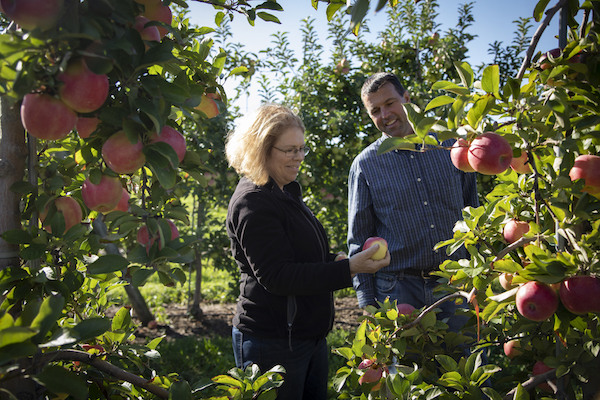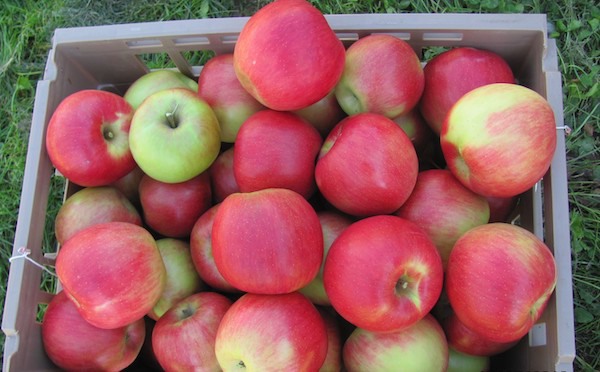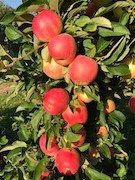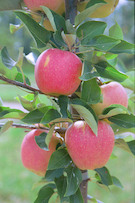This fall, apple lovers can look forward to three new varieties from the oldest apple breeding program in the U.S. — located at Cornell AgriTech in Geneva, New York, part of the College of Agriculture and Life Sciences.
On Sept. 2, Susan Brown, the Herman M. Cohn Professor of Agriculture and Life Science, and research specialist Kevin Maloney announced the release of NY56, NY73 and NY109 – marketed as Cordera, Pink Luster and Firecracker, respectively. As an open-release, orchards in New York state and across the U.S. will be able to grow the new varieties without licensing exclusivity.

Cordera
With Cordera, Brown accomplished a challenging task: breeding an apple that retains both its flavor and texture while also staying scab resistant. Apple scab is a fungal disease that significantly reduces fruit yield and quality, and poses a major threat for New England growers because it’s common in wet springs.
In addition to test plots in orchards across New York state, Wegmans has also been testing Cordera in Canandaigua, New York, for five years.
Spanish for “lamb,” Cordera was named after Brown’s predecessor, Robert Lamb, and his family. Brown said it’s fitting that this apple be named in Lamb’s honor since it’s related to the variety Liberty, which he named in 1978 along with Herb Aldwinckle, professor emeritus of plant pathology and plant-microbe biology at CALS.

Pink Luster Brown spent 23 years working with the best attributes of Honeycrisp and Gala apples to perfect Pink Luster. Its bright pink-red skin, crisp texture and juiciness make this new variety shine. Pink Luster also matures in mid-September, which makes it well-suited for on-farm sales and U-pick operations.
Brown spent 23 years working with the best attributes of Honeycrisp and Gala apples to perfect Pink Luster. Its bright pink-red skin, crisp texture and juiciness make this new variety shine. Pink Luster also matures in mid-September, which makes it well-suited for on-farm sales and U-pick operations.
"NY73 has generated substantial interest at our orchard given how pleasingly different it is from the routine common list of apples," said John Halsey, owner of the Milk Pail in Southampton, NY. "Some of the visitor comments we have heard are that it has beautiful color, medium to large size making it fun and easy to pick, wonderful mild tart flavor and very smooth enjoyable skin texture."
 Firecracker
Firecracker
Firecracker is being dubbed a “triple threat” – it’s one of few varieties that works well for eating, baking and hard cider production.
“Firecracker has a partial russet skin, and it has a unique combination of acidity and sweetness that produces really complex and evolving flavors,” Brown said. “It’s ideal for anyone who wants to go on a culinary adventure.”
70+ varieties since 1880
With the addition of Cordera, Pink Luster and Firecracker, CALS will have released more than 70 apple varieties since 1880. The most recent varieties from Brown’s breeding program, SnapDragon and RubyFrost, have been highly successful with growers across the state and are also exported to markets in Canada, Israel and Asia.
 For more information:
For more information:
Jessica Stein
Cornell University
Tel: +1 (607) 255-0270
Email: [email protected]
www.cals.cornell.edu










